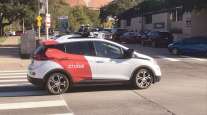GM’s Cruise Pushes Past Glitches to Map Robotaxi Expansion

[Stay on top of transportation news: Get TTNews in your inbox.]
It was a bit surprising when Cruise, the autonomous vehicle startup that’s 80% owned by General Motors, said it planned to expand its robotaxi service to Phoenix and Austin over the next three months.
The company had just recalled a previous version of its self-driving software that was in use when a car got in an accident with a human-driven Toyota Prius back in June. That same month, a bug in the system caused about a dozen Cruise autonomous vehicles to all stop in one intersection, blocking traffic for hours. There were no serious injuries — and the Prius driver was speeding — but it seemed like one of the many moments when self-driving technology had some glitches and needed to pause.
Not so, said Cruise CEO Kyle Vogt. After providing thousands of truly driverless rides and doing a lot more testing, those two incidents were rarities, he said. The software is becoming a better driver all the time, Vogt said. The barrier to deploying these robot-driven rides to even more cities has nothing to do with whether the autonomous technology is safe enough, he said, it’s how fast GM can manufacture the cars.
Next stop— Austin and Phoenix! https://t.co/DPbo6BGz3g pic.twitter.com/cSz21OYWsK — cruise (@Cruise) September 12, 2022
“The technology works, there are people using it,” Vogt said. “We’re putting cars in the cities. Now we just need to build more of them.”
GM is pumping $2 billion a year into Cruise and will begin building the Origin, a 4- to 6-passenger shuttle designed solely to be used for autonomous ride sharing, alongside the electric Hummer pickup next year at its plant in Detroit. Cruise is using a modified version of the Chevy Bolt EV now, but will switch to the Origin as the plant starts cranking them out.
Want more news? Listen to today's daily briefing above or go here for more info
After Phoenix and Austin, Cruise has a list of Sun Belt cities it is eyeing up, said Rob Grant, the company’s government affairs director. Rapid expansion is how Cruise thinks they will get to $1 billion in revenue by the end of 2025.
Cruise won’t talk about profit forecasts, but Vogt did say the business will be helped by the fact that the Origin is cheaper to build than the modified Bolts they are using now. Cruise is also working on robots to charge up the vehicles when the battery runs down and clean the cars if a passenger makes a mess. Vogt said he can imagine a day in a couple of years when humans don’t touch an Origin for “a couple hundred thousand miles.”



